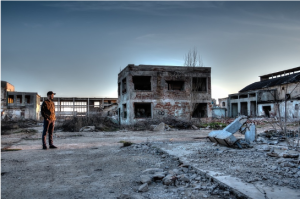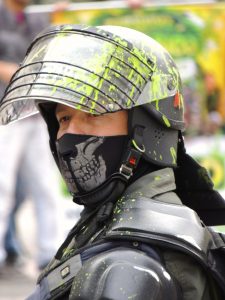
Nigerian security challenges
Top 4 threats to national security
As one of many African countries with numerous security challenges, Nigeria faces multiple security threats that are endangering people and decelerating the prosperity of the country. We took 4 security challenges for the Nigerian government to face if developing democratic and independent institutions are the main goal. Those security challenges are:

#1 Separatism of Biafran people as a security challenge
As indigenous people of Igbo started to unite under strong ethnic beliefs and feel strong and unique, the idea of having their own country slowly evolved. In the 1960s a civil war emerged over economic, religious, ethnic, and cultural tensions and resulted in a runaway state called The Republic of Biafra. The tensions endure ever since.
In the 21st century, these tensions are not gone. The leader of Indigenous People of Biafra (IPOB), Nnamdi Kanu was arrested in October 2021, in London with suspicion of being involved in terrorist actions in Nigeria. The Nigerian government is eager to deal with this group of people that are accused of a series of attacks on state leaders, politicians, and institutions.
So, even the decades after Nigeria took control over the Republic of Biafra, and regain its territorial integrity, this problem continues to exist and to have an effect on contemporary security challenges in Nigeria but also in possible civil war as one of traditional security threats.
#2 Piracy in Nigeria
In the Horn of Africa, these contemporary security challenges that reappeared after centuries continue to be a big challenge not only for the region but also globally. Many world governments along with big international companies are very interested in dealing with this problem but it remains unsolvable over the years.
#3 Organized crime

Like every country on our planet, especially those with weak institutions, law enforcement agencies, and other problems (financial, educational, ethnic, etc), Nigeria faces organized crime. Of course, the propensity to corruption is a bonus, because corruption is one of the main characteristics and preconditions for organized crime. According to Transparency International (www.transparency.org), Nigeria is in 149th place for the corruption perception index (CPI) for 2020.
Next, if we see the Global Crime Indeks (https://ocindex.net/) for the same year, we can see that the Criminality Indeks for Nigeria is 7,15 and it places Nigeria to 5th place out of 193 countries globally, 2nd place in Africa and 1st in West Africa. It is a very high index, and it should take enormous effort to lower that index.
The main branches of organized crime in Nigeria are:
• Human trafficking and smuggling
• Illegal trade (weapons, oil…)
• Wildlife trafficking
• Drug trafficking
#4 Terrorism
The first association that comes to mind when one thinks about terrorism in Nigeria is Boko Haram. This is not a mistake. Boko Haram is still a major threat to the national security of Nigeria. This is a terrorist organization operating mostly in Nort-western parts of Nigeria, but also Niger and Chad. With responsibility for hundreds of thousands of deaths, and between 2 and 3 million displaced because of the conflict, and continuous attacks on civilians, police, and armed forces, Boko Haram was and still is one of the most dangerous terrorist organizations.
The other terrorist organization operating in Nigeria is Islamic State – West Africa Province (ISWAP). ISWAP is a group subordinated to Islamic State and is an armed, radical Islamist group. Not as famous and inglorious as Boko Haram but still, with thousands of followers, ISWAP represents a major security threat to Nigerian security agencies.
Not in the list but still a great challenge
to security – COVID 19
We will conclude this list with 4 security threats to the government but in 2021, we cannot avoid mentioning the COVID 19 as one of the of-list security challenges. As we all fight this pandemic on various levels Nigeria is not excluded. Without talking about numbers, because the numbers are changing dramatically every day, this crisis remains a big challenge for security as well as for the economy, education, and many other aspects of living.





